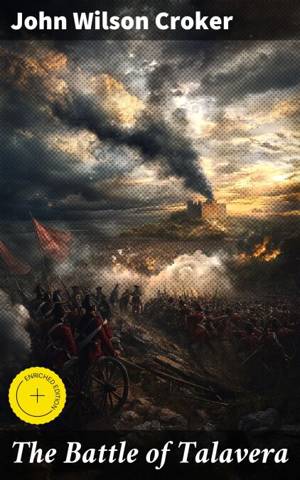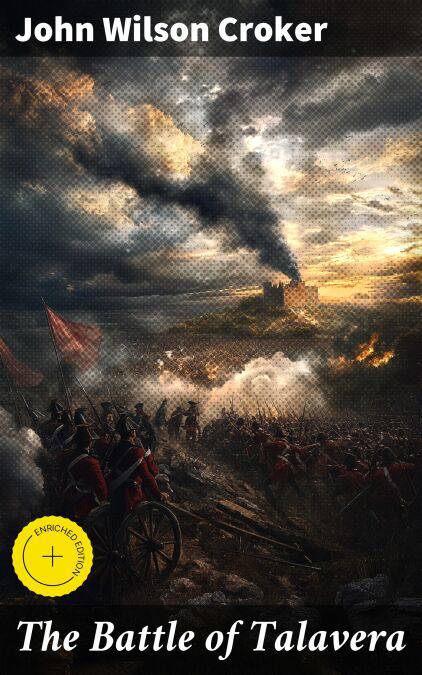
- Afhalen na 1 uur in een winkel met voorraad
- Gratis thuislevering in België vanaf € 30
- Ruim aanbod met 7 miljoen producten
- Afhalen na 1 uur in een winkel met voorraad
- Gratis thuislevering in België vanaf € 30
- Ruim aanbod met 7 miljoen producten
Zoeken
The Battle of Talavera E-BOOK
Enriched edition. Strategies, Players, and Outcomes of a Pivotal Battle
John Wilson Croker
E-book | Engels
€ 0,49
Uitvoering
Omschrijving
In "The Battle of Talavera," John Wilson Croker presents an incisive examination of a pivotal showdown during the Peninsular War, illustrating both the grand strategies and intimate human experiences of warfare. This historical narrative is steeped in vivid descriptions and thoughtful analyses, revealing the complexities of British and Spanish alliances against the backdrop of Napoleonic ambitions. Croker's prose, marked by a blend of scholarly rigor and accessible storytelling, situates the battle within its broader military and political context, contributing to the understanding of early 19th-century European conflicts. Croker, a noted Irish political figure and literary critic, brings a wealth of experience to his portrayal of military history, informed by his own engagement in contemporary political discourse and his friendships with key figures of the time. His first-hand exposure to the narratives surrounding the Peninsular War, along with his keen interest in historical documentation, likely fueled his desire to immortalize the heroism and tragedies of the Battle of Talavera, underscoring the personal stakes behind the strategic maneuvers. This book is highly recommended for historians, military enthusiasts, and general readers alike who seek a deeper understanding of the Napoleonic era. Croker's insightful analysis and narrative style not only illuminate the specifics of the battle but also resonate with broader themes of courage, sacrifice, and the cost of war, making it a significant contribution to both Victorian literature and military history.
In this enriched edition, we have carefully created added value for your reading experience:
- A succinct Introduction situates the work's timeless appeal and themes.
- The Synopsis outlines the central plot, highlighting key developments without spoiling critical twists.
- A detailed Historical Context immerses you in the era's events and influences that shaped the writing.
- A thorough Analysis dissects symbols, motifs, and character arcs to unearth underlying meanings.
- Reflection questions prompt you to engage personally with the work's messages, connecting them to modern life.
- Hand‐picked Memorable Quotes shine a spotlight on moments of literary brilliance.
- Interactive footnotes clarify unusual references, historical allusions, and archaic phrases for an effortless, more informed read.
In this enriched edition, we have carefully created added value for your reading experience:
- A succinct Introduction situates the work's timeless appeal and themes.
- The Synopsis outlines the central plot, highlighting key developments without spoiling critical twists.
- A detailed Historical Context immerses you in the era's events and influences that shaped the writing.
- A thorough Analysis dissects symbols, motifs, and character arcs to unearth underlying meanings.
- Reflection questions prompt you to engage personally with the work's messages, connecting them to modern life.
- Hand‐picked Memorable Quotes shine a spotlight on moments of literary brilliance.
- Interactive footnotes clarify unusual references, historical allusions, and archaic phrases for an effortless, more informed read.
Specificaties
Betrokkenen
- Auteur(s):
- Uitgeverij:
Inhoud
- Aantal bladzijden:
- 185
- Taal:
- Engels
Eigenschappen
- Productcode (EAN):
- 4064066135041
- Verschijningsdatum:
- 18/12/2019
- Uitvoering:
- E-book
- Beveiligd met:
- Digital watermarking
- Formaat:
- ePub

Alleen bij Standaard Boekhandel
Beoordelingen
We publiceren alleen reviews die voldoen aan de voorwaarden voor reviews. Bekijk onze voorwaarden voor reviews.








